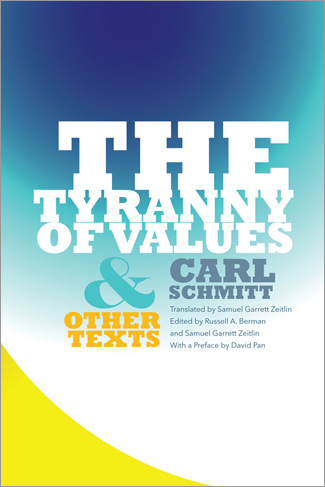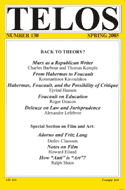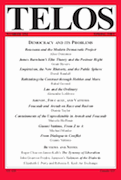By Telos Press · Monday, December 17, 2018 New from Telos Press: The Tyranny of Values and Other Texts, by Carl Schmitt. Translated by Samuel Garrett Zeitlin, edited by Russell A. Berman and Samuel Garrett Zeitlin, and with a preface by David Pan. Order your copy in our online store, and save 20% on the list price by using the coupon code BOOKS20 during the checkout process.
 Written during the Weimar Republic, the Nazi era, and the Cold War, this collection of occasional pieces provides an instructive look at the ways in which Carl Schmitt employed his theories in order to make judgments about contemporary historical events and problems. Covering topics such as the political significance of universalism and jurisprudence, the meaning of the partisan, the world-historical significance of the Cold War, the deterioration of metaphysics into “values,” the relationship between theoretical concepts and concrete historical situations, and his views on thinkers such as Machiavelli, Bodin, and Rousseau, these essays establish a revealing counterpoint to his more formal work. They react on the one hand directly to contemporary political questions and demonstrate the way in which he saw the immediate historical significance of his ideas. On the other hand, he also feels free to provide in these pieces the kinds of methodological reflections that help us to better understand the particular epistemological framework that makes his thought so unique. Written during the Weimar Republic, the Nazi era, and the Cold War, this collection of occasional pieces provides an instructive look at the ways in which Carl Schmitt employed his theories in order to make judgments about contemporary historical events and problems. Covering topics such as the political significance of universalism and jurisprudence, the meaning of the partisan, the world-historical significance of the Cold War, the deterioration of metaphysics into “values,” the relationship between theoretical concepts and concrete historical situations, and his views on thinkers such as Machiavelli, Bodin, and Rousseau, these essays establish a revealing counterpoint to his more formal work. They react on the one hand directly to contemporary political questions and demonstrate the way in which he saw the immediate historical significance of his ideas. On the other hand, he also feels free to provide in these pieces the kinds of methodological reflections that help us to better understand the particular epistemological framework that makes his thought so unique.
Continue reading →
By Charles Kollmer · Monday, July 11, 2011 As an occasional feature on TELOSscope, we highlight a past Telos article whose critical insights continue to illuminate our thinking and challenge our assumptions. Today, Charles Kollmer looks at Alexandre Lefebvre’s “A New Image of Law: Deleuze and Jurisprudence,” from Telos 130 (Spring 2005).
 Even readers with a cursory familiarity with Gilles Deleuze’s work will have no trouble surmising his critical attitude toward the law. As an abstracting and generalizing social force, law seems to stand in stark opposition to watchwords like immanence and singularity that pervade Deleuze’s texts. In “A New Image of Law: Deleuze and Jurisprudence,” Alexandre Lefebvre offers a novel interpretation of this antagonism toward the law, starting by distinguishing between law and jurisprudence. As the philosophy that informs the practice of law, jurisprudence interrupts the stasis of the legal code by actively applying it to a case. In turn, a given case takes on a genetic role in future versions of the law (conventionally referred to as precedent). Jurisprudence liberates law from appeals to transcendent values by insisting on its relevance to the here-and-now, as well as its role in the genesis of the yet-to-come. In his article, Lefebvre elaborates on this dynamic, starting with a summary of Deleuzian critiques of law, then moving toward what he terms “a new image of law,” drawing on Henri Bergson’s metaphysics in the process. Even readers with a cursory familiarity with Gilles Deleuze’s work will have no trouble surmising his critical attitude toward the law. As an abstracting and generalizing social force, law seems to stand in stark opposition to watchwords like immanence and singularity that pervade Deleuze’s texts. In “A New Image of Law: Deleuze and Jurisprudence,” Alexandre Lefebvre offers a novel interpretation of this antagonism toward the law, starting by distinguishing between law and jurisprudence. As the philosophy that informs the practice of law, jurisprudence interrupts the stasis of the legal code by actively applying it to a case. In turn, a given case takes on a genetic role in future versions of the law (conventionally referred to as precedent). Jurisprudence liberates law from appeals to transcendent values by insisting on its relevance to the here-and-now, as well as its role in the genesis of the yet-to-come. In his article, Lefebvre elaborates on this dynamic, starting with a summary of Deleuzian critiques of law, then moving toward what he terms “a new image of law,” drawing on Henri Bergson’s metaphysics in the process.
Continue reading →
By Alexandre Lefebvre · Wednesday, April 13, 2011 Alexandre Lefebvre’s “Law and the Ordinary: Hart, Wittgenstein, Jurisprudence” appears in Telos 154 (Spring 2011). Read the full version at TELOS Online website.
 This essay argues that H. L. A. Hart’s concept of jurisprudence in the first chapter of The Concept of Law is strongly influenced by the relationship that Wittgenstein establishes between ordinary and metaphysical language. The article is divided into three sections. The first section shows how jurisprudence emerges as a denial of ordinary language in its pursuit of a definition of law. The second section traces Hart’s use of ordinary language to identify idleness or emptiness in jurisprudence. The third section presents Hart’s conception of his work as therapeutic in its attempt to lead jurisprudence back to the everyday. This essay argues that H. L. A. Hart’s concept of jurisprudence in the first chapter of The Concept of Law is strongly influenced by the relationship that Wittgenstein establishes between ordinary and metaphysical language. The article is divided into three sections. The first section shows how jurisprudence emerges as a denial of ordinary language in its pursuit of a definition of law. The second section traces Hart’s use of ordinary language to identify idleness or emptiness in jurisprudence. The third section presents Hart’s conception of his work as therapeutic in its attempt to lead jurisprudence back to the everyday.
Continue reading →
|
|
 Written during the Weimar Republic, the Nazi era, and the Cold War, this collection of occasional pieces provides an instructive look at the ways in which Carl Schmitt employed his theories in order to make judgments about contemporary historical events and problems. Covering topics such as the political significance of universalism and jurisprudence, the meaning of the partisan, the world-historical significance of the Cold War, the deterioration of metaphysics into “values,” the relationship between theoretical concepts and concrete historical situations, and his views on thinkers such as Machiavelli, Bodin, and Rousseau, these essays establish a revealing counterpoint to his more formal work. They react on the one hand directly to contemporary political questions and demonstrate the way in which he saw the immediate historical significance of his ideas. On the other hand, he also feels free to provide in these pieces the kinds of methodological reflections that help us to better understand the particular epistemological framework that makes his thought so unique.
Written during the Weimar Republic, the Nazi era, and the Cold War, this collection of occasional pieces provides an instructive look at the ways in which Carl Schmitt employed his theories in order to make judgments about contemporary historical events and problems. Covering topics such as the political significance of universalism and jurisprudence, the meaning of the partisan, the world-historical significance of the Cold War, the deterioration of metaphysics into “values,” the relationship between theoretical concepts and concrete historical situations, and his views on thinkers such as Machiavelli, Bodin, and Rousseau, these essays establish a revealing counterpoint to his more formal work. They react on the one hand directly to contemporary political questions and demonstrate the way in which he saw the immediate historical significance of his ideas. On the other hand, he also feels free to provide in these pieces the kinds of methodological reflections that help us to better understand the particular epistemological framework that makes his thought so unique.  Even readers with a cursory familiarity with Gilles Deleuze’s work will have no trouble surmising his critical attitude toward the law. As an abstracting and generalizing social force, law seems to stand in stark opposition to watchwords like immanence and singularity that pervade Deleuze’s texts. In “A New Image of Law: Deleuze and Jurisprudence,” Alexandre Lefebvre offers a novel interpretation of this antagonism toward the law, starting by distinguishing between law and jurisprudence. As the philosophy that informs the practice of law, jurisprudence interrupts the stasis of the legal code by actively applying it to a case. In turn, a given case takes on a genetic role in future versions of the law (conventionally referred to as precedent). Jurisprudence liberates law from appeals to transcendent values by insisting on its relevance to the here-and-now, as well as its role in the genesis of the yet-to-come. In his article, Lefebvre elaborates on this dynamic, starting with a summary of Deleuzian critiques of law, then moving toward what he terms “a new image of law,” drawing on Henri Bergson’s metaphysics in the process.
Even readers with a cursory familiarity with Gilles Deleuze’s work will have no trouble surmising his critical attitude toward the law. As an abstracting and generalizing social force, law seems to stand in stark opposition to watchwords like immanence and singularity that pervade Deleuze’s texts. In “A New Image of Law: Deleuze and Jurisprudence,” Alexandre Lefebvre offers a novel interpretation of this antagonism toward the law, starting by distinguishing between law and jurisprudence. As the philosophy that informs the practice of law, jurisprudence interrupts the stasis of the legal code by actively applying it to a case. In turn, a given case takes on a genetic role in future versions of the law (conventionally referred to as precedent). Jurisprudence liberates law from appeals to transcendent values by insisting on its relevance to the here-and-now, as well as its role in the genesis of the yet-to-come. In his article, Lefebvre elaborates on this dynamic, starting with a summary of Deleuzian critiques of law, then moving toward what he terms “a new image of law,” drawing on Henri Bergson’s metaphysics in the process.  This essay argues that H. L. A. Hart’s concept of jurisprudence in the first chapter of The Concept of Law is strongly influenced by the relationship that Wittgenstein establishes between ordinary and metaphysical language. The article is divided into three sections. The first section shows how jurisprudence emerges as a denial of ordinary language in its pursuit of a definition of law. The second section traces Hart’s use of ordinary language to identify idleness or emptiness in jurisprudence. The third section presents Hart’s conception of his work as therapeutic in its attempt to lead jurisprudence back to the everyday.
This essay argues that H. L. A. Hart’s concept of jurisprudence in the first chapter of The Concept of Law is strongly influenced by the relationship that Wittgenstein establishes between ordinary and metaphysical language. The article is divided into three sections. The first section shows how jurisprudence emerges as a denial of ordinary language in its pursuit of a definition of law. The second section traces Hart’s use of ordinary language to identify idleness or emptiness in jurisprudence. The third section presents Hart’s conception of his work as therapeutic in its attempt to lead jurisprudence back to the everyday. 






